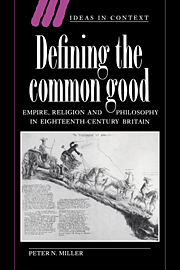Book contents
5 - The common good, toleration and freedom of thought
Published online by Cambridge University Press: 23 October 2009
Summary
The ubiquity of prudence and the pre–eminent standard of the public utility are salient features of seventeenth– and eighteenth century European political thought. This was as true for those writers who stressed liberty and moral reformation as a means to this end as for the more bureaucratic defenders of the aggrandizement of the state. The convergence of opposition and government on the character of the ‘common’ good and its associated principles may account for the relative absence of theoretical debate about political concepts in Britain in the 1750s.
One of the most important consequences of the Seven Years War was to offer a challenge, at first only logistical, to the uncontested theoretical hegemony of public utility. Subsequently, the debate about colonial representation focused attention on the contest between the claims of the sovereign and the obligations of the citizen. While no one challenged the supremacy of a common good as the end of political life, there were those who questioned the constitution of that ‘common’ or shared goal. Proponents of ‘actual’ representation were suggesting that individuals had themselves to determine this shared interest for it to be accepted as the legitimate measure of political practice. In part, this reflected feelings of distance and lack of reciprocity within what was no longer felt to be a single community. But the increasing weight borne by the individual in this anti–ministerial argument depended upon a much stronger theory of personality.
This chapter will set forth the philosophical background as well as the specific arguments for religious toleration that followed from it and which were debated in the 1760s and 1770s.
- Type
- Chapter
- Information
- Defining the Common GoodEmpire, Religion and Philosophy in Eighteenth-Century Britain, pp. 266 - 348Publisher: Cambridge University PressPrint publication year: 1994
- 1
- Cited by

